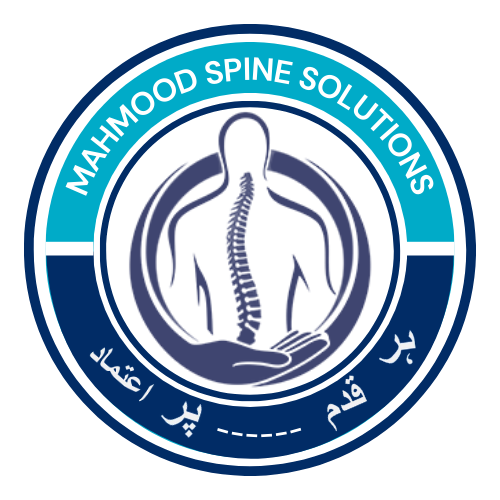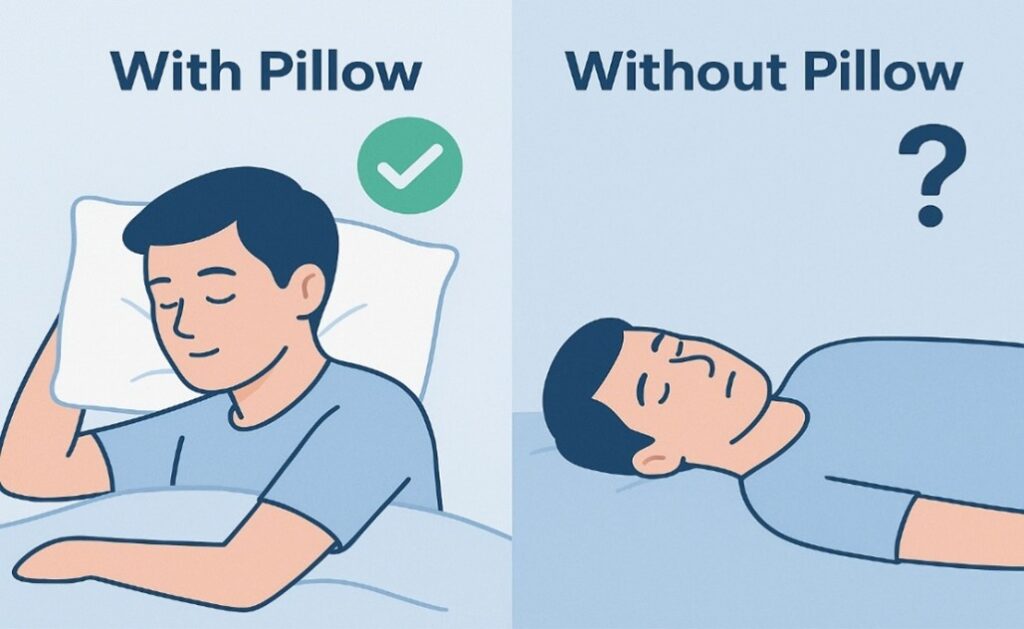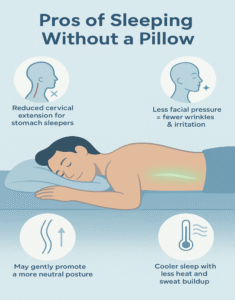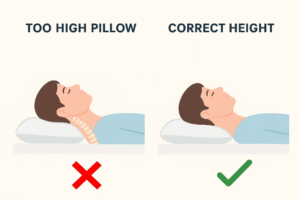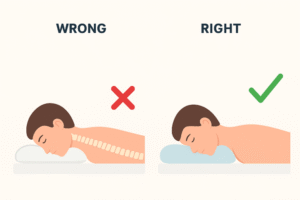Sleeping habits play a significant role in spinal health, muscle relaxation, and overall quality of rest. One of the most debated sleep topics is whether it’s better to sleep with or without a pillow. While pillows are designed to support spinal alignment and comfort, some people claim that going pillow-free reduces pain and improves posture. The truth depends largely on your sleeping position, spinal structure, and personal comfort.
Understanding the Role of a Pillow:
A pillow is more than just a comfort accessory — it’s a supportive tool that helps maintain the natural curvature of the spine.
- The cervical spine (neck region) naturally curves slightly forward.
- A pillow helps fill the gap between the neck and the mattress, preventing the head from tilting too far backward or forward.
- Proper alignment ensures that your muscles, ligaments, and joints stay relaxed, minimizing strain and tension during sleep.
- When a pillow is too thick or too thin, it disturbs this alignment, causing the neck to bend unnaturally, which can result in stiffness, pain, or even chronic discomfort.
Effects on the Spine When Sleeping Without a Pillow:
-
Cervical (Neck) Spine:
The cervical spine is highly sensitive to alignment.
- Without a pillow (especially for back or side sleepers): The neck may flex downward, increasing stress on cervical muscles and intervertebral discs. This can lead to neck stiffness, muscle fatigue, or even nerve compression.
- For stomach sleepers: Sleeping without a pillow can actually reduce the backward bending (extension) of the neck that usually occurs when the head rests on a thick pillow. This helps relieve tension in the cervical area.
-
Thoracic (Mid-Back) Spine:
Poor neck alignment can affect the entire chain of spinal posture. If the head is tilted too far forward or backward, it can alter the curve of the thoracic spine, leading to upper back and shoulder tension over time.
-
Lumbar (Lower Back) Spine:
If the head and neck are misaligned, the lower spine compensates, increasing lumbar strain.
- In stomach sleepers, removing the pillow can reduce lumbar arching and relieve lower back pain.
- In back or side sleepers, it may worsen lumbar discomfort because of the loss of support balance.
Pros of Sleeping Without a Pillow:
-
Can Benefit Stomach Sleepers:
Stomach sleeping naturally forces the head to turn to one side and the neck to extend backward. A thick pillow worsens this extension, creating cervical strain. Without a pillow, the head stays closer to a neutral position, reducing stress on the neck and upper spine.
-
May Reduce Wrinkles and Skin Pressure:
Sleeping without a pillow decreases the amount of friction and compression between your face and the pillow surface, which can minimize the formation of wrinkles and reduce skin irritation or acne caused by pillow bacteria and sweat.
-
Natural Spinal Adjustment (in some cases):
Some people with forward head posture (common from long computer or phone use) may find that sleeping without a pillow helps encourage a more neutral head position, though this must be done cautiously and gradually.
-
Reduces Heat and Sweat Buildup:
Without a pillow, your head stays cooler, which may improve sleep quality for those who tend to overheat at night.
Cons of Sleeping Without a Pillow:
-
Risk of Neck Pain and Stiffness:
The biggest drawback is lack of support for the cervical spine.
For side and back sleepers, the head falls too low, forcing the neck to bend downward and the muscles to overwork. Over time, this can cause morning stiffness, tension headaches, and chronic neck pain.
-
Misalignment of the Spine:
Sleeping without a pillow can flatten the natural curve of the cervical spine, leading to misalignment of the entire spinal column, particularly when combined with poor mattress support.
-
Poor Sleep Quality:
Discomfort due to lack of support may cause you to toss and turn frequently, leading to fragmented sleep and less restorative rest.
-
Not Suitable for People with Existing Spine Conditions:
Individuals with cervical spondylosis, herniated discs, or arthritis require specific support to keep pressure off affected joints. Sleeping without a pillow can aggravate these issues and worsen pain.
Pillow Use Recommendations Based on Sleep Position:
- Back Sleeper:
Thin, medium-firm pillow (or cervical pillow). Keeps neck aligned with spine and supports the natural curve.
- Side Sleeper:
Firm, thick pillow (height equal to shoulder width). Fills the gap between neck and shoulder to maintain neutral alignment.
- Stomach Sleeper:
No pillow or very thin, soft pillow. Prevents excessive neck extension and spinal arching.
- Mixed/Combination Sleeper:
Adjustable or memory foam pillow. Provides flexibility for multiple positions during the night.
How to Transition If You Want to Try Sleeping Without a Pillow:
If you’re considering it for posture or comfort reasons, do it gradually:
- Start with a thin pillow or a folded towel.
- Monitor your comfort: If you wake up with neck pain or stiffness, return to a low-profile pillow.
- Support other body parts: Use a small pillow under your pelvis (for stomach sleepers) or knees (for back sleepers) to maintain neutral spinal curves.
- Ensure your mattress supports your spine well. A saggy mattress can make any pillow setup harmful.
Conclusion:
Sleeping without a pillow is not inherently good or bad — it depends on your body mechanics, sleeping posture, and spinal health.
For stomach sleepers, it can help reduce pressure on the neck and lower back.
For back or side sleepers, it often leads to poor alignment and discomfort.
The key is to maintain a neutral spine — whether that’s achieved with a supportive pillow or by sleeping without one. If you frequently experience neck, back, or shoulder pain, consult a physiotherapist or spine specialist to determine the best sleeping position and support system for your needs.
